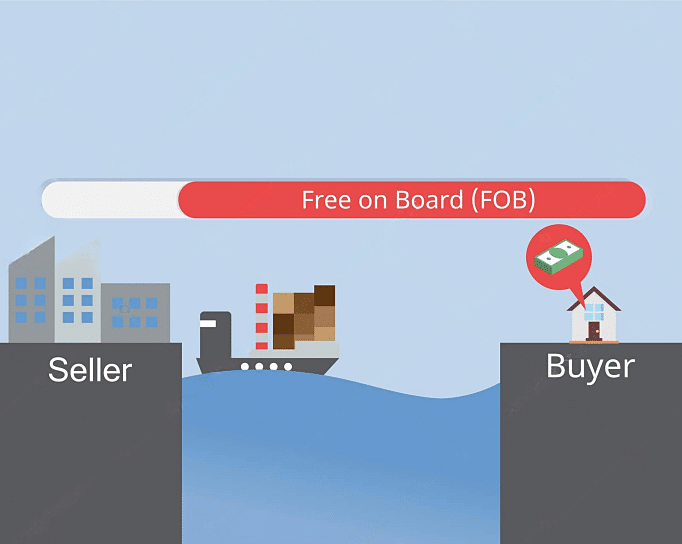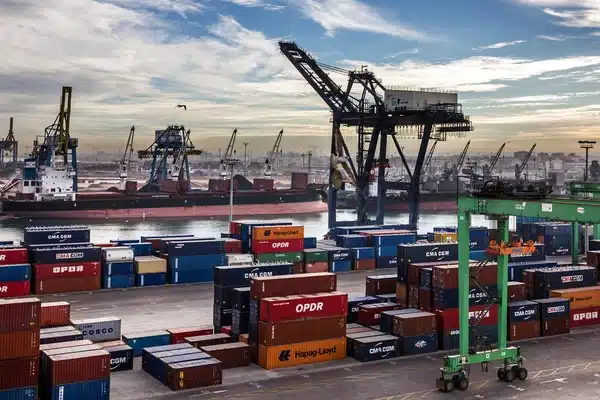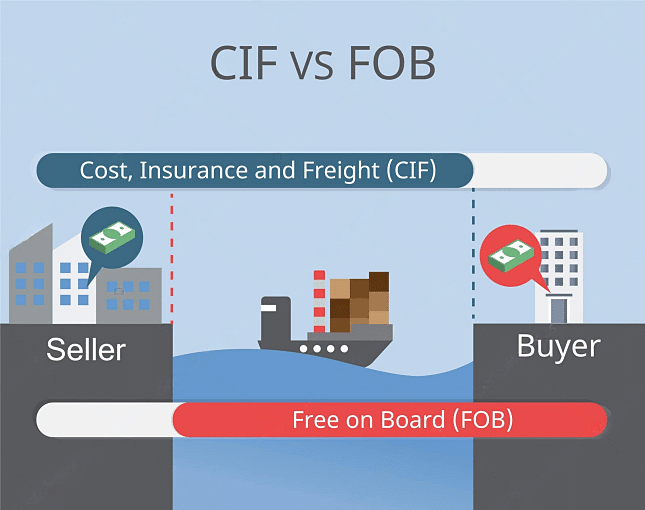When importing goods from China, understanding trade terms is essential to managing logistics, costs, and responsibilities effectively. One of the most commonly used Incoterms is FOB, or Free on Board, which plays a critical role in international shipping contracts. FOB defines the point at which responsibility for goods transfers from the seller to the buyer, impacting everything from logistics planning to cost allocation.
In this guide, we will explore the FOB shipping term in detail, including what it means, how it works, and how it impacts importing from China. We will also discuss the advantages and disadvantages of using FOB, as well as provide some practical tips for importers to make the most of this trade term.

What Is FOB?
FOB, or Free on Board, is an Incoterm that defines the point at which the seller’s responsibilities end and the buyer’s responsibilities begin in the shipping process. Under FOB, the seller is responsible for delivering the goods to the designated port of shipment and loading them onto the vessel. Once the goods are on board, the responsibility for transportation, insurance, and any subsequent risks shifts to the buyer.
There are two main types of FOB:
FOB Origin (FOB Shipping Point): The seller’s responsibility ends when the goods are loaded onto the vessel at the port of origin. The buyer assumes all risks and costs from that point onward.
FOB Destination: The seller retains responsibility until the goods arrive at the destination port, but this version is less commonly used in international trade.
FOB is typically used for sea freight and inland waterway shipments, making it a popular choice for importers sourcing goods from China.
How Does FOB Work in International Shipping?
Under an FOB agreement, both the seller and the buyer have specific responsibilities that must be fulfilled to ensure a smooth shipping process.
Seller’s Responsibilities:
Production and Packaging: The seller is responsible for manufacturing the goods and ensuring they are properly packaged for export.
Export Customs Clearance: The seller must complete all necessary customs formalities in China, ensuring the goods are cleared for export.
Delivery to Port and Loading: The seller must transport the goods to the port of shipment and load them onto the vessel. All costs incurred until the goods are loaded, such as inland transportation and port handling, are the seller’s responsibility.
Buyer’s Responsibilities:
Freight Costs: Once the goods are loaded onto the vessel, the buyer is responsible for the main carriage, which includes ocean freight charges.
Insurance: It is the buyer’s responsibility to arrange insurance coverage for the goods during transit from the port of origin to the final destination.
Import Customs Clearance and Duties: The buyer is responsible for clearing the goods at the destination port, paying any import duties, and handling local delivery to the final destination.
Advantages of Using FOB When Importing from China
1. Greater Control Over Shipping
One of the main advantages of using FOB when importing from China is that it gives the buyer more control over the shipping process. Once the goods are loaded onto the vessel, the buyer can choose the shipping line, negotiate freight rates, and select additional services such as insurance or warehousing. This level of control can lead to cost savings and improved efficiency.
2. Transparency in Shipping Costs
With FOB, the buyer has a clear understanding of the costs associated with shipping, as they assume responsibility for freight and other expenses after the goods are on board. This transparency allows buyers to compare different shipping options and select the most cost-effective solution.
3. Reduced Risk of Overcharges
By arranging their own freight, buyers can reduce the risk of overcharges from suppliers. In some cases, sellers may add markups to freight costs when handling shipping on behalf of the buyer. With FOB, the buyer can work directly with shipping lines or freight forwarders to obtain competitive rates.
4. Flexibility in Choosing Freight Forwarders
FOB allows buyers to choose their preferred freight forwarders, giving them more flexibility in managing logistics. This is particularly beneficial for businesses that have established relationships with reliable forwarders who offer better rates or services tailored to their needs.

Disadvantages of Using FOB When Importing from China
1. Increased Responsibility for the Buyer
Under FOB, the buyer takes on more responsibility compared to other Incoterms, such as CIF (Cost, Insurance, and Freight) or DDP (Delivered Duty Paid). The buyer must manage freight, insurance, customs clearance, and local delivery, which can be challenging for those without experience in international logistics.
2. Risk During Ocean Transit
Once the goods are loaded onto the vessel, the buyer assumes all risks, including potential damage, loss, or delays during ocean transit. Buyers must ensure they have adequate insurance coverage to protect their investment during shipping.
3. Potential for Miscommunication
FOB requires clear communication between the buyer, seller, and freight forwarder to ensure that goods are loaded onto the vessel without issues. Miscommunication can lead to delays or additional costs if responsibilities are not clearly defined and fulfilled by all parties.
FOB vs. CIF: Which Is Better for Importing from China?
FOB (Free on Board) and CIF (Cost, Insurance, and Freight) are two of the most common Incoterms used in international trade, each with its own advantages and disadvantages.
FOB: Under FOB, the buyer has more control over the shipping process and can arrange their own freight, insurance, and delivery. This provides more flexibility but also requires more responsibility.
CIF: With CIF, the seller handles freight and insurance until the goods reach the destination port. This option is more convenient for the buyer, as they have fewer logistics to manage. However, CIF can be more expensive since the seller typically includes a markup for arranging these services.
When to Choose FOB: FOB is ideal for experienced buyers who are comfortable managing international shipping and want to have control over logistics and costs.
When to Choose CIF: CIF is a better option for buyers who prefer a simpler process with fewer responsibilities, even if it means potentially higher costs.

Tips for Importing from China Using FOB
1. Work with a Reliable Freight Forwarder
To ensure a smooth shipping process, it’s important to work with a reliable freight forwarder who has experience with FOB shipments from China. A good freight forwarder can help manage logistics, provide competitive freight rates, and handle customs clearance at the destination port.
2. Understand Customs Requirements
Importing from China requires a good understanding of the customs regulations in your country. Be prepared with the necessary documentation, including a commercial invoice, packing list, bill of lading, and any import permits. Working with a customs broker can help ensure compliance and avoid delays.
3. Arrange Insurance Coverage
Since the buyer assumes the risk once the goods are on board, arranging adequate insurance coverage is crucial. Marine insurance can protect your shipment against potential risks such as damage, loss, or theft during transit.
4. Communicate Clearly with Your Supplier
Clear communication with your supplier is key to avoiding misunderstandings and ensuring that the goods are delivered to the port and loaded onto the vessel as agreed. Make sure your supplier understands the terms of the FOB agreement and their responsibilities.
Conclusion
FOB (Free on Board) is a widely used Incoterm for importing goods from China, offering buyers greater control over the shipping process, transparency in costs, and flexibility in choosing freight forwarders. However, it also comes with increased responsibilities and potential risks during transit. Understanding the advantages and disadvantages of FOB can help importers make informed decisions about whether this trade term is the right choice for their business.
For businesses looking for reliable freight forwarding services to manage FOB shipments from China, Tonlexing offers comprehensive logistics solutions tailored to your needs. With years of experience in international shipping, we provide end-to-end services that ensure your goods reach their destination safely and efficiently. Contact us today to learn more about how we can support your importing needs.


